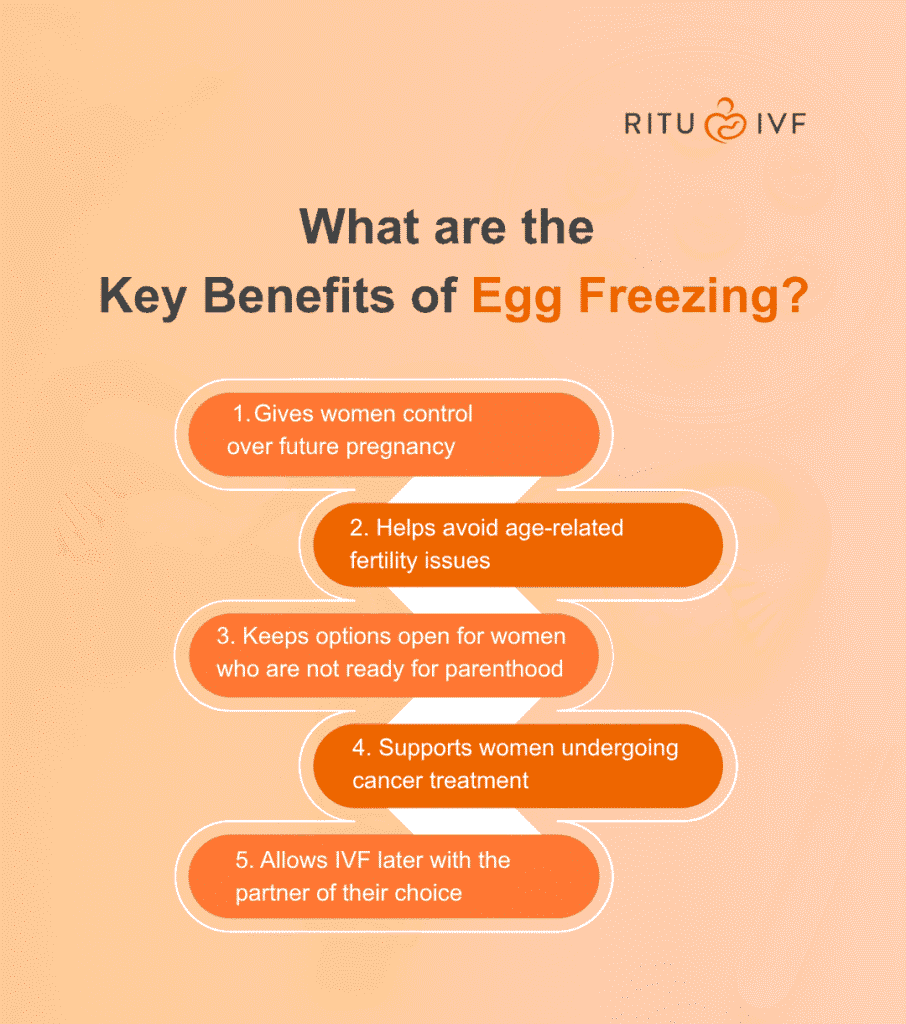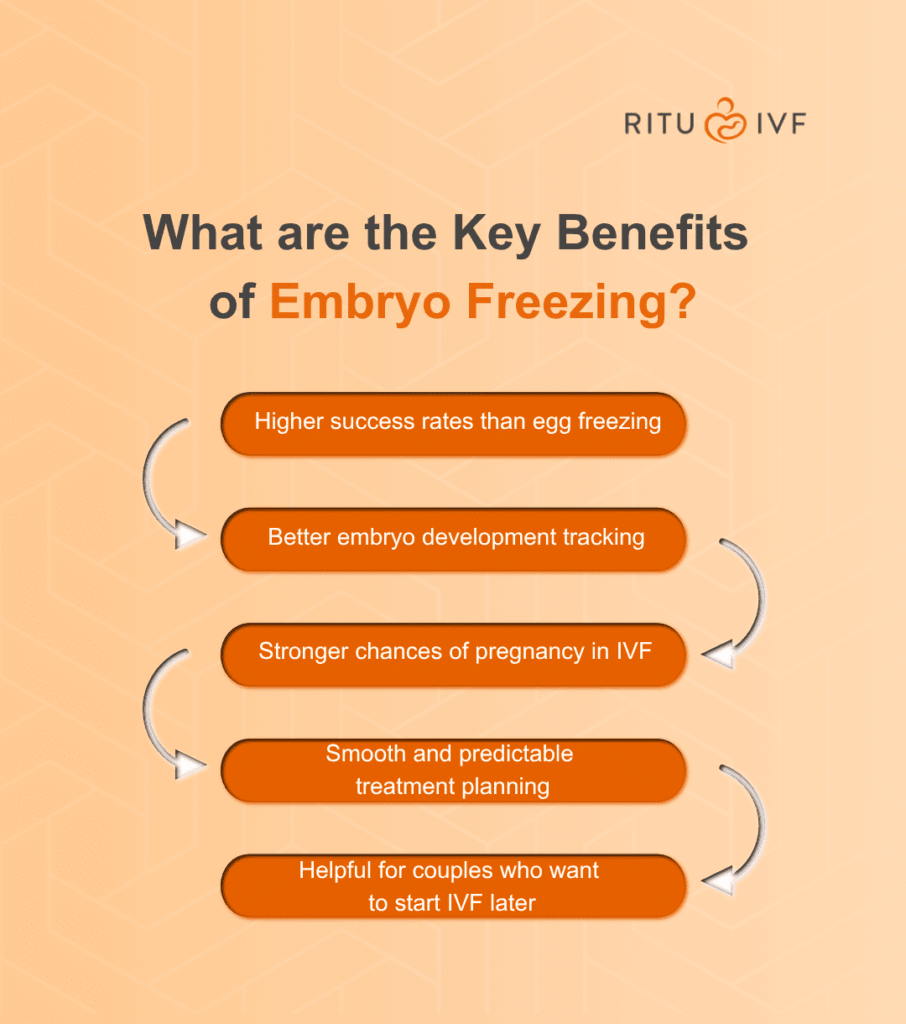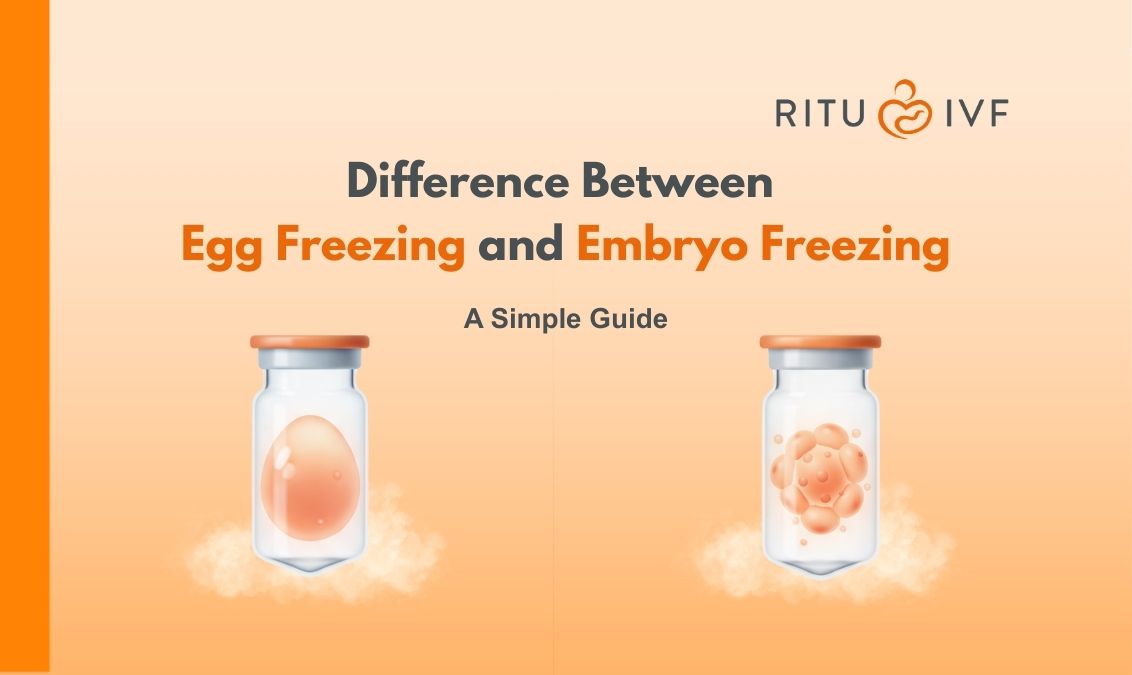Do you want to know the difference between freezing eggs and embryos? How do they work, and which option is right for you? If yes, this blog is for you. Here, we are going to discuss each so you can clear all your doubts and make the right choice for your fertility preservation.
Today, many women and couples want more control over their future family plans. Because careers, health conditions, late marriages, or personal choices can delay pregnancy. That’s why fertility preservation has become very important, and for that, there are two choices as egg freezing and embryo freezing. Both treatments are helpful. But most people are confused, and they want to know the key difference between egg freezing and embryo freezing so that they can plan their fertility in a better and stress-free way. Both procedures sound similar, and yet they work differently and are used for different needs.
When it comes to fertility preservation the first question that comes to mind is which one is better, freezing eggs or freezing embryos. Both are separate processes, and each one has its own pros and cons. People are confused whether eggs are fertilised before or after. It totally depends on whether you want to decide now or later who will fertilize them.
Before we discuss the difference between freezing eggs and embryos, let’s start by knowing egg freezing.
Need an Appointment?
CLICK HEREWhat Is Egg Freezing?
Egg freezing is a process in which a woman’s eggs are collected and frozen for future use. The medical name for this process is oocyte cryopreservation. And in this, unfertilized eggs are stored, which allows a woman to preserve her fertility without needing a partner at the time of the procedure.
Here is a step-by-step process that defines how egg freezing works –
- The woman takes hormonal injections to grow multiple eggs.
- When the eggs are ready, the doctor collects them.
- The eggs are frozen at a very low temperature and stored safely.
When a woman decides to get pregnant, the IVF technique is used with frozen eggs. The egg freezing procedure is beneficial when a woman wants to preserve her fertility, but at that time, she doesn’t have a partner. The difference between egg and embryo freezing starts here. Because in the egg freezing process, sperm are not required.
What Is Embryo Freezing?
Embryo freezing is almost the same process as egg freezing. But in this one step is an extra. When doctors collect eggs, they fertilize them with sperm to create embryos. Once an embryo is created, it is frozen and stored. This method is mainly chosen by married couples who are planning a pregnancy later. It provides higher stability because an embryo is already fertilized and ready for plantation.
Both methods are used for fertilisation preservation, but the purposes and planning behind each differ. In simple words, egg freezing means freezing unfertilized eggs, and embryo freezing means freezing fertilised embryos.
Need an Appointment?
CLICK HEREDifference Between Egg Freezing and Embryo Freezing
The main difference between egg freezing and embryo freezing is only one step. In embryo freezing, sperm are needed, but in egg freezing, no sperm are required. Apart from that, both have their own purpose. And each one is used for a different purpose. Once you couples know the basic difference between egg and embryo freezing, they can easily make the right choice.
For your help, we have created a table so that everyone can understand the basic difference between freezing eggs and embryos.
Feature | Egg Freezing | Embryo Freezing |
What is frozen? | Unfertilized eggs. | Fertilized eggs (embryos). |
Fertilization timing | Happens after eggs are thawed and retrieved for use in the future. | Happens before the eggs are frozen. |
Ideal for | Single women or those who want to keep their options open regarding a future partner or sperm donor. | Couples or individuals with a known partner or donor sperm, who are ready to take the IVF route but want to delay pregnancy. |
Flexibility | More flexible because a sperm source is not needed at the time of freezing. | Less flexible because it requires a sperm source upfront and locks in a co-parenting partner. |
Success rates | Success rates depend on factors like age, and fewer eggs may survive the thawing process. | Generally has slightly higher success rates because you know the embryos were successfully created and can be tested for viability. |
Cost | Potentially lower upfront costs, as you only pay for egg retrieval and freezing. You will have additional costs for IVF and fertilization later. | Higher upfront costs because you pay for IVF and fertilization upfront, even if you never use the embryos. |
Let’s understand the basic difference in detail –
1. Need for Sperm
- In egg freezing, no sperm is needed.
- Embryo freezing, sperm required to create the embryo.
2. Flexibility
- Egg freezing gives women more independence and future choice.
- Embryo freezing requires both partners to agree in the future.
3. Storage Stability
- Embryos are generally more stable than eggs.
- Frozen eggs need careful handling but are highly successful with modern technology.
4. Use in IVF
- Frozen eggs must be fertilized later.
- Frozen embryos can be directly transferred to the uterus during IVF.
5. Success Chances
Embryos usually have higher success rates than frozen eggs. Because they are already fertilized. This is one major difference between freezing eggs and embryos.
Your Journey to Motherhood Starts Here
“With advanced fertility care and personalized support every step of the way.”
Contact UsHow Success Rates Differ for Egg Freezing and Embryo Freezing
Success rate is one of the biggest concerns for couples. While both options are reliable, there is a difference in the outcome.
There are various factors that determine the freezing eggs success rate. Here are some of them.
- The woman’s age at the time of freezing
- Egg quality
- Number of eggs collected
Younger women who are below the age of 35 usually get better results because younger eggs are healthier.
Embryo freezing success rate depends on:
- Embryo quality
- The stage of embryo growth
- The sperm and egg quality
Embryos generally have a slightly higher success rate than frozen eggs. Because they already show clear signs of healthy development. This is an important difference between egg and embryo freezing for couples deciding which one is suitable for them.
Egg and Embryo Freezing: Who Should Choose What?
Freezing eggs and freezing embryos are different, but the outcome is the same. But each one is used according to its purpose. Each person has different needs. So let’s start to know which one is better for whom.
Choose Egg Freezing if:
- You are single and want to preserve fertility.
- You want to delay motherhood for career or personal reasons.
- You are facing medical treatments like chemotherapy.
- You want more flexibility in choosing a partner later.
Choose Embryo Freezing if:
- You have a partner and want to plan future pregnancy.
- You want higher success chances in IVF.
- You are ready to fertilize eggs immediately.
- You and your partner are okay with legal agreements.
Once you know the difference between freezing eggs and embryos, it becomes very easy to choose the right option that feels right for your future plans.
What are the Key Benefits of Egg Freezing?

Here is the list of the key advantages that you get when you opt for egg freezing for fertility preservation.
- Gives women control over future pregnancy
- Helps avoid age-related fertility issues
- Keeps options open for women who are not ready for parenthood
- Supports women undergoing cancer treatment
- Allows IVF later with the partner of their choice
Egg freezing has become an important part of today’s egg and embryo freezing solutions because it gives women independence.
What are the Key Benefits of Embryo Freezing?

Embryo freezing has become a popular option for couples who want more certainty. Here are the key benefits of embryo freezing.
- Higher success rates than egg freezing
- Better embryo development tracking
- Stronger chances of pregnancy in IVF
- Smooth and predictable treatment planning
- Helpful for couples who want to start IVF later
Embryo freezing is often recommended by doctors when both partners are ready and agree on long-term plans.
What is the Cost Difference Between Egg and Embryo Freezing?
Cost is another major factor that plays a vital role in choosing a fertility preservation method. In most clinics, egg freezing costs include medication, egg retrieval, and annual storage. Meanwhile, in embryo freezing, costs include everything like egg freezing and IVF fertilization charges. That means embryo freezing is usually a little more expensive because it involves lab fertilization and embryo development monitoring. Price may vary according to age, egg count, medicine dosage, and technology used.
Procedure | Includes | Approximate Cost Range | Additional Notes |
Egg Freezing | Egg retrieval, freezing, and storage | ₹1,00,000 to ₹2,50,000 | Does not include fertilization cost |
Embryo Freezing | Egg retrieval, fertilization with sperm, embryo culture, and storage | ₹1,50,000 to ₹3,00,000 | Slightly higher due to the lab fertilization process |
Storage Charges | Annual maintenance of frozen eggs/embryos | ₹15,000 to ₹30,000 per year | Varies by clinic and duration of storage |
Why Choose Ritu IVF for Fertility Preservation
At Ritu IVF, we understand that choosing between egg freezing and embryo freezing is a big decision. And that’s why our specialist guides you in a perfect way so that you can choose the best that fits the best for you. Here, you get experienced doctors, advanced freezing technology, safe storage, and complete emotional support that make Ritu IVF the best fertility centre in Jaipur. Whether you are planning egg freezing or embryo freezing, you can contact Ritu IVF at any time. Our experts are there for you 24X7.
Final Words
We hope this blog helps you to know the difference between egg freezing and embryo freezing. At first, it may be confusing, but after reading this blog, you will know which one suits you best. The right choice depends on your age, partner status, medical history, and future plans. Both options offer hope, flexibility, and a secure future for parenthood. At Ritu IVF, you can make a confident decision that supports your dreams.
Frequently Asked Questions (FAQs)
Q1. What Do Doctors Recommend for the Best Results in Egg and Embryo Freezing?
Ans. Here is the key suggestion by fertility experts.
- Women below 35 get the best results with egg freezing.
- Couples ready for IVF often choose embryo freezing for better success.
- More eggs or embryos stored, the higher the chances later.
- A healthy lifestyle improves freezing quality.
- Early decisions give the best future outcome.
Doctors at Ritu IVF always guide patients based on their age, health, and family planning goals.
Q2. Which is better, egg freezing or embryo freezing?
Ans. Both fertility preservation methods have their benefits. Egg freezing is ideal for single women who want to preserve fertility for the future, while embryo freezing is best for couples who are ready to fertilize the eggs now and plan future pregnancies.
Q3. How long can frozen eggs or embryos be stored?
Ans. Both eggs and embryos can be safely stored for 10 to 15 years or even longer if kept under proper conditions in an IVF lab. The success rate depends on the woman’s age and egg quality at the time of freezing.
Q4. Does freezing eggs or embryos affect pregnancy success?
Ans. Not much. With modern vitrification techniques, the success rates of frozen eggs and embryos are almost similar to fresh ones. However, embryo freezing usually shows slightly higher success rates.
Q5. Is the process of egg freezing painful?
Ans. No, the process is generally not painful. Egg retrieval is done under light anesthesia, so you won’t feel any discomfort. Mild cramping or bloating may occur for a day or two.




